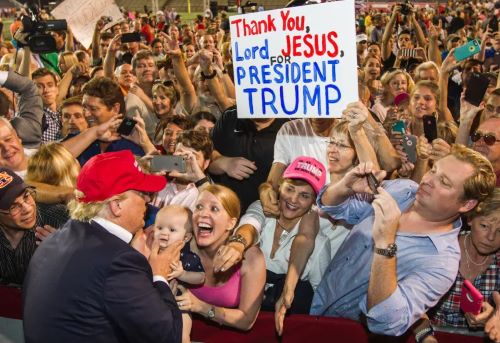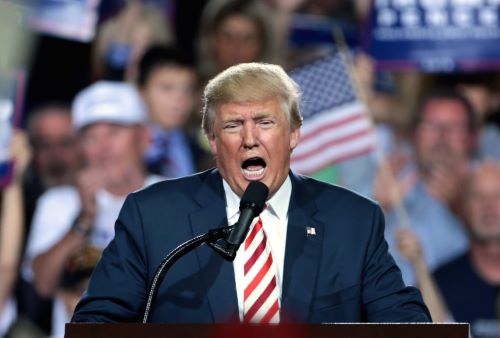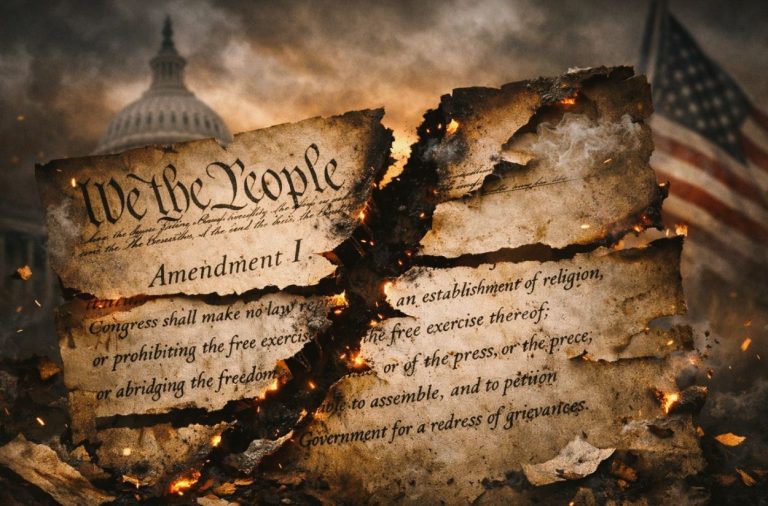

The label “cult” in the context of Trump’s supporters signifies more than mere political affiliation.

Curated/Reviewed by Matthew A. McIntosh
Public Historian
Brewminate
Introduction
The term “Trump cult” has become a polarizing descriptor in contemporary political discourse, encapsulating the intense and unwavering devotion of a substantial segment of the population to the former President, Donald J. Trump. This phenomenon raises intriguing questions about the nature of political allegiance, the dynamics of charismatic leadership, and the impact of populist movements on the fabric of modern democracies.
Defining the Trump Cult
The label “cult” in the context of Trump’s supporters signifies more than mere political affiliation; it suggests a level of devotion and loyalty that transcends traditional party lines. This intense allegiance is often characterized by an almost religious fervor, where followers exhibit unwavering support for Trump, regardless of policy decisions, controversies, or norm-defying behavior.
Factors Shaping the Trump Cult
Charismatic Leadership

Central to the Trump cult is the charismatic leadership style of the former President. Trump’s unorthodox communication, brash demeanor, and direct engagement with his audience set him apart from traditional politicians. His ability to connect emotionally with his supporters, often bypassing conventional political discourse, plays a pivotal role in fostering this cult-like following.
Populist Appeal
The Trump phenomenon is deeply rooted in populist sentiments. By positioning himself as an outsider challenging the established political elite, Trump appealed to those who felt disenfranchised or overlooked. His rhetoric, focused on addressing the concerns of the “forgotten” or “silent” majority, resonated with a significant portion of the electorate.
Media Landscape
The evolving media landscape, particularly the rise of social media, has significantly contributed to the development of the Trump cult. Trump’s adept use of platforms like Twitter allowed him to communicate directly with his base, creating an unfiltered and exclusive connection. This direct communication strategy diminished the influence of traditional media, fostering a sense of intimacy between Trump and his supporters.
Cultural and Identity Factors
The Trump cult is intertwined with cultural and identity considerations. For many followers, supporting Trump is not merely a political choice but a reflection of shared identity and cultural values. Trump’s emphasis on issues such as immigration, nationalism, and cultural conservatism has solidified his appeal among specific demographics.
Economic Discontent
Economic concerns and grievances also play a role in the Trump cult. Supporters in economically distressed regions found resonance in Trump’s promises of revitalizing industries, renegotiating trade deals, and bringing jobs back to America. Economic anxieties contributed to the cultivation of a loyal following among those who felt left behind by globalization.
Critiques and Concerns
While the Trump cult energized a significant segment of the population, it has not been immune to criticism. Skeptics argue that such unwavering loyalty can lead to the erosion of democratic norms, as individuals prioritize allegiance over critical evaluation of policies and actions. Concerns also arise regarding the potential for manipulation and the impact of echo chambers, where dissenting voices are dismissed, contributing to a narrowing of perspectives.
Conclusion
The Trump cult, a complex and multifaceted phenomenon, underscores the changing dynamics of political engagement in contemporary democracies. It sheds light on the potency of charismatic leadership, the resonance of populist appeals, and the transformative influence of evolving media landscapes. Understanding the Trump cult is crucial for comprehending the broader shifts occurring in modern democracies and for addressing the challenges posed by intense political allegiance on democratic institutions and norms.


